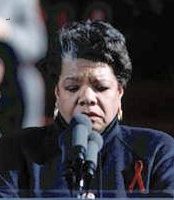Original name MARGUERITE JOHNSON (b. April 4, 1928, St. Louis, Mo., U.S. – d. May 28, 2014, Winston-Salem N.N.).
Maya Angelou was a black American poet whose several volumes of autobiography explore the themes of economic, racial, and sexual oppression.
Although born in St. Louis, Angelou spent much of her childhood in the care of her maternal grandmother in rural Stamps, Ark. Raped at the age of eight by her mother’s boyfriend, she went through an extended period of muteness. This early life is the focus of Angelou’s first autobiographical work, I Know Why the Caged Bird Sings (1970). Subsequent volumes of autobiography include Gather Together in My Name (1974), Singin’ and Swingin’ and Gettin’ Merry Like Christmas (1976), The Heart of a Woman (1981), and All God’s Children Need Traveling Shoes (1986).
In 1940 Angelou moved with her mother to San Francisco and worked intermittently as a cocktail waitress, a prostitute and madam, a cook, and a dancer. It was in the latter pursuit that she assumed her professional name. The literary talent recognized and nurtured by an early mentor led Angelou in the late 1950s to New York City, where she found encouragement from the Harlem Writers’ Guild. She lived in Egypt and Ghana for several years during the 1960s.
Angelou’s poetry, collected in such volumes as Just Give Me a Cool Drink of Water ‘fore I Diiie (1971), And Still I Rise (1978), Now Sheba Sings the Song (1987), and I Shall Not Be Moved (1990), draws heavily on her personal history but employs the points of view of various personae. She also wrote a book of meditations, Wouldn’t Take Nothing For My Journey Now (1993), and a children’s book titled My Painted House, My Friendly Chicken and Me (1994). In 1981 she became a professor of American studies at Wake Forest University, Winston-Salem, N.C. Among numerous other honours was her invitation to compose and deliver a poem for the inauguration of President Bill Clinton in 1993.
